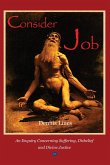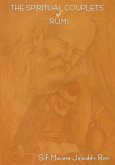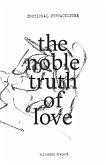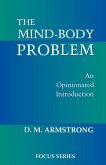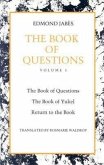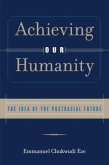Bruce Waller
Consider Philosophy
Bruce Waller
Consider Philosophy
- Broschiertes Buch
- Merkliste
- Auf die Merkliste
- Bewerten Bewerten
- Teilen
- Produkt teilen
- Produkterinnerung
- Produkterinnerung
Consider Philosophy is based on the belief that philosophy is filled with fascinating questions. It is designed to invite every student into deep, enjoyable, and accessible philosophical exploration. Featuring selections from the world's most influential philosophers, this combination of primary texts and explanatory pedagogy presents philosophy in a clear, accessible way that does not sacrifice rigor. Making connections among different philosophical theories throughout, Consider Philosophy helps students to engage in subject matter and apply theories to important philosophical issues. It…mehr
Andere Kunden interessierten sich auch für
![Consider Job Consider Job]() Dennis LinesConsider Job15,99 €
Dennis LinesConsider Job15,99 €![The Spiritual Couplets of Maulana Jalalu-'d-Dln Muhammad Rumi The Spiritual Couplets of Maulana Jalalu-'d-Dln Muhammad Rumi]() Sufi Maulana Jalaluddin RumiThe Spiritual Couplets of Maulana Jalalu-'d-Dln Muhammad Rumi20,99 €
Sufi Maulana Jalaluddin RumiThe Spiritual Couplets of Maulana Jalalu-'d-Dln Muhammad Rumi20,99 €![Emotional Permaculture Emotional Permaculture]() Elisabeth HowlandEmotional Permaculture27,99 €
Elisabeth HowlandEmotional Permaculture27,99 €![The Mind-body Problem The Mind-body Problem]() D. M. ArmstrongThe Mind-body Problem69,99 €
D. M. ArmstrongThe Mind-body Problem69,99 €![Science Transformed? Science Transformed?]() Science Transformed?61,99 €
Science Transformed?61,99 €![The Book of Questions The Book of Questions]() Edmond JabèsThe Book of Questions37,99 €
Edmond JabèsThe Book of Questions37,99 €![Achieving Our Humanity Achieving Our Humanity]() Emmanuel C. EzeAchieving Our Humanity78,99 €
Emmanuel C. EzeAchieving Our Humanity78,99 €-
-
-
Consider Philosophy is based on the belief that philosophy is filled with fascinating questions. It is designed to invite every student into deep, enjoyable, and accessible philosophical exploration. Featuring selections from the world's most influential philosophers, this combination of primary texts and explanatory pedagogy presents philosophy in a clear, accessible way that does not sacrifice rigor. Making connections among different philosophical theories throughout, Consider Philosophy helps students to engage in subject matter and apply theories to important philosophical issues. It offers a balance of theory and applications through a mix of text and readings, and begins each chapter covering philosophical theory, followed by related, classical readings. NEW! Pearson's Reading Hour Program for Instructors Interested in reviewing new and updated texts in Philosophy? Click on the below link to choose an electronic chapter to preview... Settle back, read, and receive a Penguin paperback for your time!
Hinweis: Dieser Artikel kann nur an eine deutsche Lieferadresse ausgeliefert werden.
Hinweis: Dieser Artikel kann nur an eine deutsche Lieferadresse ausgeliefert werden.
Produktdetails
- Produktdetails
- Verlag: Pearson Education
- Seitenzahl: 512
- Erscheinungstermin: 1. Oktober 2010
- Englisch
- Abmessung: 251mm x 203mm x 20mm
- Gewicht: 771g
- ISBN-13: 9780205644223
- ISBN-10: 0205644228
- Artikelnr.: 27034710
- Herstellerkennzeichnung
- Libri GmbH
- Europaallee 1
- 36244 Bad Hersfeld
- gpsr@libri.de
- Verlag: Pearson Education
- Seitenzahl: 512
- Erscheinungstermin: 1. Oktober 2010
- Englisch
- Abmessung: 251mm x 203mm x 20mm
- Gewicht: 771g
- ISBN-13: 9780205644223
- ISBN-10: 0205644228
- Artikelnr.: 27034710
- Herstellerkennzeichnung
- Libri GmbH
- Europaallee 1
- 36244 Bad Hersfeld
- gpsr@libri.de
Dr. Bruce N. Waller is Chair of the Department of Philosophy and Religious Studies at Youngstown State University. He received his Ph.D. in 1979 from the University of North Carolina at Chapel Hill. His other works include Consider Ethics: Theory, Readings, and Contemporary Issues, Critical Thinking: Consider the Verdict, You Decide! Current Debates in Criminal Justice, You Decide! Current Debates in Contemporary Moral Problems, You Decide! Current Debates in Introductory Philosophy, You Decide! Current Debates in Ethics, and Coffee and Philosophy: A Conversational Introduction to Philosophy with Readings.
Table of Contents
Chapter One: Thinking Critically and Cordially About Philosophy
What is Philosophy?
Thinking Critically and Playing Fair
Deductive and Inductive Arguments
Thinking Critically and Cooperatively
Irrelevant Reason Fallacy
Ad Hominem Arguments
Strawman Fallacy
Appeal to Authority
Readings
Plato, Apology
Bertrand Russell, The Value of Philosophy
Exercises
Additional Reading
Chapter Two: Philosophical Questions About Religion
Conceptions of God
Arguments for the Existence of God
The Cosmological Argument
The Ontological Argument
The Argument from Design
The Intuitive Argument
Pascal's Wager
The Problem of Evil
Ockham's Razor
Do Science and Religion Occupy Different Spheres?
Readings
From Genesis and Exodus
Spinoza, from A Theologico-Political Treatise
Aristotle, from The Metaphysics
St. Thomas Aquinas, Summa Theologica (The Five Ways)
Leibniz, from Theodicy
Stephen Gould, "Non-Overlapping Magisteria"
Richard Dawkins, "You Can't Have it Both Ways: Irreconcilable Differences?"
Exercises
Additional Reading
Chapter Three: What Can We Know?
Skepticism
Descartes
Certainty
Descartes and Reason
Descartes' Method of Doubt
I Think, Therefore I Exist
The Lasting Influence of Descartes
Readings
Descartes, Meditations, 1 and 2
Wittgenstein, from On Certainty
Exercises
Additional Reading
Chapter Four: Rationalism, Empiricism, Kant
Rationalism
God said, Let Newton Be
Empiricism
John Locke
David Hume
Immanuel Kant
Readings
David Hume, An Enquiry Concerning Human Understanding, sections 2 and 12
Immanuel Kant, from Prolegomena to any Future Metaphysics
Exercises
Additional Reading
Chapter Five: Contemporary Epistemology
Permanence and Change
Evolution
Darwin
Pragmatism
Readings
William James, from Pragmatism
Bertrand Russell, "Transatlantic Truth"
John Dewey, from Reconstruction in Philosophy
Exercises
Additional Reading
Chapter Six: What Is the Mind?
Mechanism and the Mind
Descartes and Mind-Body Dualism
Advantages of Mind-Body Dualism
Problems for Mind-Body Dualism
Interactionism
Preestablished Harmony
Occasionalism
Idealism
Materialism
Dual-Aspect Theory
Functionalism
Epiphenomenalism
Consciousness
Readings
Descartes, Meditations, 6
Daniel Dennett, "Where Am I?"
Thomas Nagel, "What Is It Like to Be a Bat?"
Exercises
Additional Reading
Chapter Seven: Personal Identity
Practical Implications of Personal Identity
Physical Identity
Souls and Personal Identity
Memory and Identity
Science Fiction and Personal Identity Problems
Beyond Personal Identity
Strains on Our Ordinary Concept of Personal Identity
Identity and the One
The Narrative Account of Personal Identity
Narrative Truth
Our Modular Brain
Narrative Accountability
Readings
John Locke, from Essay Concerning Human Understanding
David Hume, from A Treatise of Human Nature
Derek Parfit, from Reasons and Persons
Alasdair MacIntyre, from After Virtue
Exercises
Additional Reading
Chapter Eight: Fatalism, Determinism, Free Will
Fatalism
Fatalism and Determinism
Determinism
Reactions to Determinism
Readings
Lorenzo de Valla, "Dialogue on Free Will
Martin Luther, from Bondage of the Will
David Hume, Enquiry Concerning the Human Understanding
Exercises
Additional Reading
Chapter 9: Is Free Will Compatible With Determinism?
Does Determinism Destroy Creativity?
Does Determinism Destroy Free Will?
Hard Determinism
Soft Determinism (Compatibilism)
Hume's Compatibilism
Hierarchical Compatibilism
Challenges to Hierarchical Compatibilism
Rationalist Compatibilism
Readings
William James, from Pragmatism
Harry G. Frankfurt, "Freedom of Will and the Concept of a Person"
Susan Wolf, "Asymmetrical Freedom"
Exercises
Additional Reading
Chapter 10: Are We Morally Responsible?
Libertarian Free Will
What About Moral Responsibility?
Strong Feelings and Moral Responsibility
Readings
Giovanni Pico della Mirandola, "Oration on the Dignity of Man"
C. A. Campbell, from On Selfhood and Godhood
Thomas Nagel, "Moral Luck"
Daniel Dennett, from Elbow Room
Bruce N. Waller, "Uneven Starts and Just Deserts"
Exercises
Additional Reading
Chapter 11: Ethics: Reason and Emotion
Kantian Rationalist Ethics
Utilitarian Ethics
Criticisms of Utilitarianism
Readings
David Hume, from A Treatise of Human Nature
Immanuel Kant, from Fundamental Principles of the Metaphysics of Morals
Jonathan Bennett, "The Conscience of Huckleberry Finn"
John Stuart Mill, from Utilitarianism
Exercises
Additional Reading
Chapter 12: Ethical Theories
Divine Command Theory of Ethics
Relativism
Egoism
Social Contract Ethics
Care Ethics
Readings
James Rachels, "God and Human Attitudes"
George N. Schlesinger, from New Perspectives on Old-Time Religion
Elvin Hatch, "The Good Side of Relativism"
Thomas Hobbes, Leviathan
Jean Hampton,"Two Faces of Contractarian Thought"
Annette Baier,"What Do Women Want in a Moral Theory?"
Exercises
Additional Reading
Chapter 13: Are There Objective Ethical Truths?
Intuitionism
Virtue Ethics
Ethical Nonobjectivism
The Argument from Diversity
The Argument from Queerness
Contemporary Moral Realism
Readings
W. D. Ross, from The Right and the Good
Aristotle, from Nicomachean Ethics
J. L. Mackie, from Ethics: Inventing Right and Wrong
Michael Smith, "Realism"
Richard Rorty, from Philosophy and Social Hope
Exercises
Additional Reading
Chapter 14: Political Philosophy
Justification of Government
The Social Contract
Obeying or Disobeying the Law
Liberal and Conservative
Positive and Negative Liberty
Readings
Jean-Jacques Rousseau, from "The Origin of Inequality"
Henry David Thoreau, from "Resistance to Civil Government"
John Stuart Mill, from On Liberty
Eric Mack, "Liberty and Justice"
Hugh LaFollette, "Why Libertarianism Is Mistaken"
Exercises
Additional Reading
Chapter One: Thinking Critically and Cordially About Philosophy
What is Philosophy?
Thinking Critically and Playing Fair
Deductive and Inductive Arguments
Thinking Critically and Cooperatively
Irrelevant Reason Fallacy
Ad Hominem Arguments
Strawman Fallacy
Appeal to Authority
Readings
Plato, Apology
Bertrand Russell, The Value of Philosophy
Exercises
Additional Reading
Chapter Two: Philosophical Questions About Religion
Conceptions of God
Arguments for the Existence of God
The Cosmological Argument
The Ontological Argument
The Argument from Design
The Intuitive Argument
Pascal's Wager
The Problem of Evil
Ockham's Razor
Do Science and Religion Occupy Different Spheres?
Readings
From Genesis and Exodus
Spinoza, from A Theologico-Political Treatise
Aristotle, from The Metaphysics
St. Thomas Aquinas, Summa Theologica (The Five Ways)
Leibniz, from Theodicy
Stephen Gould, "Non-Overlapping Magisteria"
Richard Dawkins, "You Can't Have it Both Ways: Irreconcilable Differences?"
Exercises
Additional Reading
Chapter Three: What Can We Know?
Skepticism
Descartes
Certainty
Descartes and Reason
Descartes' Method of Doubt
I Think, Therefore I Exist
The Lasting Influence of Descartes
Readings
Descartes, Meditations, 1 and 2
Wittgenstein, from On Certainty
Exercises
Additional Reading
Chapter Four: Rationalism, Empiricism, Kant
Rationalism
God said, Let Newton Be
Empiricism
John Locke
David Hume
Immanuel Kant
Readings
David Hume, An Enquiry Concerning Human Understanding, sections 2 and 12
Immanuel Kant, from Prolegomena to any Future Metaphysics
Exercises
Additional Reading
Chapter Five: Contemporary Epistemology
Permanence and Change
Evolution
Darwin
Pragmatism
Readings
William James, from Pragmatism
Bertrand Russell, "Transatlantic Truth"
John Dewey, from Reconstruction in Philosophy
Exercises
Additional Reading
Chapter Six: What Is the Mind?
Mechanism and the Mind
Descartes and Mind-Body Dualism
Advantages of Mind-Body Dualism
Problems for Mind-Body Dualism
Interactionism
Preestablished Harmony
Occasionalism
Idealism
Materialism
Dual-Aspect Theory
Functionalism
Epiphenomenalism
Consciousness
Readings
Descartes, Meditations, 6
Daniel Dennett, "Where Am I?"
Thomas Nagel, "What Is It Like to Be a Bat?"
Exercises
Additional Reading
Chapter Seven: Personal Identity
Practical Implications of Personal Identity
Physical Identity
Souls and Personal Identity
Memory and Identity
Science Fiction and Personal Identity Problems
Beyond Personal Identity
Strains on Our Ordinary Concept of Personal Identity
Identity and the One
The Narrative Account of Personal Identity
Narrative Truth
Our Modular Brain
Narrative Accountability
Readings
John Locke, from Essay Concerning Human Understanding
David Hume, from A Treatise of Human Nature
Derek Parfit, from Reasons and Persons
Alasdair MacIntyre, from After Virtue
Exercises
Additional Reading
Chapter Eight: Fatalism, Determinism, Free Will
Fatalism
Fatalism and Determinism
Determinism
Reactions to Determinism
Readings
Lorenzo de Valla, "Dialogue on Free Will
Martin Luther, from Bondage of the Will
David Hume, Enquiry Concerning the Human Understanding
Exercises
Additional Reading
Chapter 9: Is Free Will Compatible With Determinism?
Does Determinism Destroy Creativity?
Does Determinism Destroy Free Will?
Hard Determinism
Soft Determinism (Compatibilism)
Hume's Compatibilism
Hierarchical Compatibilism
Challenges to Hierarchical Compatibilism
Rationalist Compatibilism
Readings
William James, from Pragmatism
Harry G. Frankfurt, "Freedom of Will and the Concept of a Person"
Susan Wolf, "Asymmetrical Freedom"
Exercises
Additional Reading
Chapter 10: Are We Morally Responsible?
Libertarian Free Will
What About Moral Responsibility?
Strong Feelings and Moral Responsibility
Readings
Giovanni Pico della Mirandola, "Oration on the Dignity of Man"
C. A. Campbell, from On Selfhood and Godhood
Thomas Nagel, "Moral Luck"
Daniel Dennett, from Elbow Room
Bruce N. Waller, "Uneven Starts and Just Deserts"
Exercises
Additional Reading
Chapter 11: Ethics: Reason and Emotion
Kantian Rationalist Ethics
Utilitarian Ethics
Criticisms of Utilitarianism
Readings
David Hume, from A Treatise of Human Nature
Immanuel Kant, from Fundamental Principles of the Metaphysics of Morals
Jonathan Bennett, "The Conscience of Huckleberry Finn"
John Stuart Mill, from Utilitarianism
Exercises
Additional Reading
Chapter 12: Ethical Theories
Divine Command Theory of Ethics
Relativism
Egoism
Social Contract Ethics
Care Ethics
Readings
James Rachels, "God and Human Attitudes"
George N. Schlesinger, from New Perspectives on Old-Time Religion
Elvin Hatch, "The Good Side of Relativism"
Thomas Hobbes, Leviathan
Jean Hampton,"Two Faces of Contractarian Thought"
Annette Baier,"What Do Women Want in a Moral Theory?"
Exercises
Additional Reading
Chapter 13: Are There Objective Ethical Truths?
Intuitionism
Virtue Ethics
Ethical Nonobjectivism
The Argument from Diversity
The Argument from Queerness
Contemporary Moral Realism
Readings
W. D. Ross, from The Right and the Good
Aristotle, from Nicomachean Ethics
J. L. Mackie, from Ethics: Inventing Right and Wrong
Michael Smith, "Realism"
Richard Rorty, from Philosophy and Social Hope
Exercises
Additional Reading
Chapter 14: Political Philosophy
Justification of Government
The Social Contract
Obeying or Disobeying the Law
Liberal and Conservative
Positive and Negative Liberty
Readings
Jean-Jacques Rousseau, from "The Origin of Inequality"
Henry David Thoreau, from "Resistance to Civil Government"
John Stuart Mill, from On Liberty
Eric Mack, "Liberty and Justice"
Hugh LaFollette, "Why Libertarianism Is Mistaken"
Exercises
Additional Reading
Table of Contents
Chapter One: Thinking Critically and Cordially About Philosophy
What is Philosophy?
Thinking Critically and Playing Fair
Deductive and Inductive Arguments
Thinking Critically and Cooperatively
Irrelevant Reason Fallacy
Ad Hominem Arguments
Strawman Fallacy
Appeal to Authority
Readings
Plato, Apology
Bertrand Russell, The Value of Philosophy
Exercises
Additional Reading
Chapter Two: Philosophical Questions About Religion
Conceptions of God
Arguments for the Existence of God
The Cosmological Argument
The Ontological Argument
The Argument from Design
The Intuitive Argument
Pascal's Wager
The Problem of Evil
Ockham's Razor
Do Science and Religion Occupy Different Spheres?
Readings
From Genesis and Exodus
Spinoza, from A Theologico-Political Treatise
Aristotle, from The Metaphysics
St. Thomas Aquinas, Summa Theologica (The Five Ways)
Leibniz, from Theodicy
Stephen Gould, "Non-Overlapping Magisteria"
Richard Dawkins, "You Can't Have it Both Ways: Irreconcilable Differences?"
Exercises
Additional Reading
Chapter Three: What Can We Know?
Skepticism
Descartes
Certainty
Descartes and Reason
Descartes' Method of Doubt
I Think, Therefore I Exist
The Lasting Influence of Descartes
Readings
Descartes, Meditations, 1 and 2
Wittgenstein, from On Certainty
Exercises
Additional Reading
Chapter Four: Rationalism, Empiricism, Kant
Rationalism
God said, Let Newton Be
Empiricism
John Locke
David Hume
Immanuel Kant
Readings
David Hume, An Enquiry Concerning Human Understanding, sections 2 and 12
Immanuel Kant, from Prolegomena to any Future Metaphysics
Exercises
Additional Reading
Chapter Five: Contemporary Epistemology
Permanence and Change
Evolution
Darwin
Pragmatism
Readings
William James, from Pragmatism
Bertrand Russell, "Transatlantic Truth"
John Dewey, from Reconstruction in Philosophy
Exercises
Additional Reading
Chapter Six: What Is the Mind?
Mechanism and the Mind
Descartes and Mind-Body Dualism
Advantages of Mind-Body Dualism
Problems for Mind-Body Dualism
Interactionism
Preestablished Harmony
Occasionalism
Idealism
Materialism
Dual-Aspect Theory
Functionalism
Epiphenomenalism
Consciousness
Readings
Descartes, Meditations, 6
Daniel Dennett, "Where Am I?"
Thomas Nagel, "What Is It Like to Be a Bat?"
Exercises
Additional Reading
Chapter Seven: Personal Identity
Practical Implications of Personal Identity
Physical Identity
Souls and Personal Identity
Memory and Identity
Science Fiction and Personal Identity Problems
Beyond Personal Identity
Strains on Our Ordinary Concept of Personal Identity
Identity and the One
The Narrative Account of Personal Identity
Narrative Truth
Our Modular Brain
Narrative Accountability
Readings
John Locke, from Essay Concerning Human Understanding
David Hume, from A Treatise of Human Nature
Derek Parfit, from Reasons and Persons
Alasdair MacIntyre, from After Virtue
Exercises
Additional Reading
Chapter Eight: Fatalism, Determinism, Free Will
Fatalism
Fatalism and Determinism
Determinism
Reactions to Determinism
Readings
Lorenzo de Valla, "Dialogue on Free Will
Martin Luther, from Bondage of the Will
David Hume, Enquiry Concerning the Human Understanding
Exercises
Additional Reading
Chapter 9: Is Free Will Compatible With Determinism?
Does Determinism Destroy Creativity?
Does Determinism Destroy Free Will?
Hard Determinism
Soft Determinism (Compatibilism)
Hume's Compatibilism
Hierarchical Compatibilism
Challenges to Hierarchical Compatibilism
Rationalist Compatibilism
Readings
William James, from Pragmatism
Harry G. Frankfurt, "Freedom of Will and the Concept of a Person"
Susan Wolf, "Asymmetrical Freedom"
Exercises
Additional Reading
Chapter 10: Are We Morally Responsible?
Libertarian Free Will
What About Moral Responsibility?
Strong Feelings and Moral Responsibility
Readings
Giovanni Pico della Mirandola, "Oration on the Dignity of Man"
C. A. Campbell, from On Selfhood and Godhood
Thomas Nagel, "Moral Luck"
Daniel Dennett, from Elbow Room
Bruce N. Waller, "Uneven Starts and Just Deserts"
Exercises
Additional Reading
Chapter 11: Ethics: Reason and Emotion
Kantian Rationalist Ethics
Utilitarian Ethics
Criticisms of Utilitarianism
Readings
David Hume, from A Treatise of Human Nature
Immanuel Kant, from Fundamental Principles of the Metaphysics of Morals
Jonathan Bennett, "The Conscience of Huckleberry Finn"
John Stuart Mill, from Utilitarianism
Exercises
Additional Reading
Chapter 12: Ethical Theories
Divine Command Theory of Ethics
Relativism
Egoism
Social Contract Ethics
Care Ethics
Readings
James Rachels, "God and Human Attitudes"
George N. Schlesinger, from New Perspectives on Old-Time Religion
Elvin Hatch, "The Good Side of Relativism"
Thomas Hobbes, Leviathan
Jean Hampton,"Two Faces of Contractarian Thought"
Annette Baier,"What Do Women Want in a Moral Theory?"
Exercises
Additional Reading
Chapter 13: Are There Objective Ethical Truths?
Intuitionism
Virtue Ethics
Ethical Nonobjectivism
The Argument from Diversity
The Argument from Queerness
Contemporary Moral Realism
Readings
W. D. Ross, from The Right and the Good
Aristotle, from Nicomachean Ethics
J. L. Mackie, from Ethics: Inventing Right and Wrong
Michael Smith, "Realism"
Richard Rorty, from Philosophy and Social Hope
Exercises
Additional Reading
Chapter 14: Political Philosophy
Justification of Government
The Social Contract
Obeying or Disobeying the Law
Liberal and Conservative
Positive and Negative Liberty
Readings
Jean-Jacques Rousseau, from "The Origin of Inequality"
Henry David Thoreau, from "Resistance to Civil Government"
John Stuart Mill, from On Liberty
Eric Mack, "Liberty and Justice"
Hugh LaFollette, "Why Libertarianism Is Mistaken"
Exercises
Additional Reading
Chapter One: Thinking Critically and Cordially About Philosophy
What is Philosophy?
Thinking Critically and Playing Fair
Deductive and Inductive Arguments
Thinking Critically and Cooperatively
Irrelevant Reason Fallacy
Ad Hominem Arguments
Strawman Fallacy
Appeal to Authority
Readings
Plato, Apology
Bertrand Russell, The Value of Philosophy
Exercises
Additional Reading
Chapter Two: Philosophical Questions About Religion
Conceptions of God
Arguments for the Existence of God
The Cosmological Argument
The Ontological Argument
The Argument from Design
The Intuitive Argument
Pascal's Wager
The Problem of Evil
Ockham's Razor
Do Science and Religion Occupy Different Spheres?
Readings
From Genesis and Exodus
Spinoza, from A Theologico-Political Treatise
Aristotle, from The Metaphysics
St. Thomas Aquinas, Summa Theologica (The Five Ways)
Leibniz, from Theodicy
Stephen Gould, "Non-Overlapping Magisteria"
Richard Dawkins, "You Can't Have it Both Ways: Irreconcilable Differences?"
Exercises
Additional Reading
Chapter Three: What Can We Know?
Skepticism
Descartes
Certainty
Descartes and Reason
Descartes' Method of Doubt
I Think, Therefore I Exist
The Lasting Influence of Descartes
Readings
Descartes, Meditations, 1 and 2
Wittgenstein, from On Certainty
Exercises
Additional Reading
Chapter Four: Rationalism, Empiricism, Kant
Rationalism
God said, Let Newton Be
Empiricism
John Locke
David Hume
Immanuel Kant
Readings
David Hume, An Enquiry Concerning Human Understanding, sections 2 and 12
Immanuel Kant, from Prolegomena to any Future Metaphysics
Exercises
Additional Reading
Chapter Five: Contemporary Epistemology
Permanence and Change
Evolution
Darwin
Pragmatism
Readings
William James, from Pragmatism
Bertrand Russell, "Transatlantic Truth"
John Dewey, from Reconstruction in Philosophy
Exercises
Additional Reading
Chapter Six: What Is the Mind?
Mechanism and the Mind
Descartes and Mind-Body Dualism
Advantages of Mind-Body Dualism
Problems for Mind-Body Dualism
Interactionism
Preestablished Harmony
Occasionalism
Idealism
Materialism
Dual-Aspect Theory
Functionalism
Epiphenomenalism
Consciousness
Readings
Descartes, Meditations, 6
Daniel Dennett, "Where Am I?"
Thomas Nagel, "What Is It Like to Be a Bat?"
Exercises
Additional Reading
Chapter Seven: Personal Identity
Practical Implications of Personal Identity
Physical Identity
Souls and Personal Identity
Memory and Identity
Science Fiction and Personal Identity Problems
Beyond Personal Identity
Strains on Our Ordinary Concept of Personal Identity
Identity and the One
The Narrative Account of Personal Identity
Narrative Truth
Our Modular Brain
Narrative Accountability
Readings
John Locke, from Essay Concerning Human Understanding
David Hume, from A Treatise of Human Nature
Derek Parfit, from Reasons and Persons
Alasdair MacIntyre, from After Virtue
Exercises
Additional Reading
Chapter Eight: Fatalism, Determinism, Free Will
Fatalism
Fatalism and Determinism
Determinism
Reactions to Determinism
Readings
Lorenzo de Valla, "Dialogue on Free Will
Martin Luther, from Bondage of the Will
David Hume, Enquiry Concerning the Human Understanding
Exercises
Additional Reading
Chapter 9: Is Free Will Compatible With Determinism?
Does Determinism Destroy Creativity?
Does Determinism Destroy Free Will?
Hard Determinism
Soft Determinism (Compatibilism)
Hume's Compatibilism
Hierarchical Compatibilism
Challenges to Hierarchical Compatibilism
Rationalist Compatibilism
Readings
William James, from Pragmatism
Harry G. Frankfurt, "Freedom of Will and the Concept of a Person"
Susan Wolf, "Asymmetrical Freedom"
Exercises
Additional Reading
Chapter 10: Are We Morally Responsible?
Libertarian Free Will
What About Moral Responsibility?
Strong Feelings and Moral Responsibility
Readings
Giovanni Pico della Mirandola, "Oration on the Dignity of Man"
C. A. Campbell, from On Selfhood and Godhood
Thomas Nagel, "Moral Luck"
Daniel Dennett, from Elbow Room
Bruce N. Waller, "Uneven Starts and Just Deserts"
Exercises
Additional Reading
Chapter 11: Ethics: Reason and Emotion
Kantian Rationalist Ethics
Utilitarian Ethics
Criticisms of Utilitarianism
Readings
David Hume, from A Treatise of Human Nature
Immanuel Kant, from Fundamental Principles of the Metaphysics of Morals
Jonathan Bennett, "The Conscience of Huckleberry Finn"
John Stuart Mill, from Utilitarianism
Exercises
Additional Reading
Chapter 12: Ethical Theories
Divine Command Theory of Ethics
Relativism
Egoism
Social Contract Ethics
Care Ethics
Readings
James Rachels, "God and Human Attitudes"
George N. Schlesinger, from New Perspectives on Old-Time Religion
Elvin Hatch, "The Good Side of Relativism"
Thomas Hobbes, Leviathan
Jean Hampton,"Two Faces of Contractarian Thought"
Annette Baier,"What Do Women Want in a Moral Theory?"
Exercises
Additional Reading
Chapter 13: Are There Objective Ethical Truths?
Intuitionism
Virtue Ethics
Ethical Nonobjectivism
The Argument from Diversity
The Argument from Queerness
Contemporary Moral Realism
Readings
W. D. Ross, from The Right and the Good
Aristotle, from Nicomachean Ethics
J. L. Mackie, from Ethics: Inventing Right and Wrong
Michael Smith, "Realism"
Richard Rorty, from Philosophy and Social Hope
Exercises
Additional Reading
Chapter 14: Political Philosophy
Justification of Government
The Social Contract
Obeying or Disobeying the Law
Liberal and Conservative
Positive and Negative Liberty
Readings
Jean-Jacques Rousseau, from "The Origin of Inequality"
Henry David Thoreau, from "Resistance to Civil Government"
John Stuart Mill, from On Liberty
Eric Mack, "Liberty and Justice"
Hugh LaFollette, "Why Libertarianism Is Mistaken"
Exercises
Additional Reading


